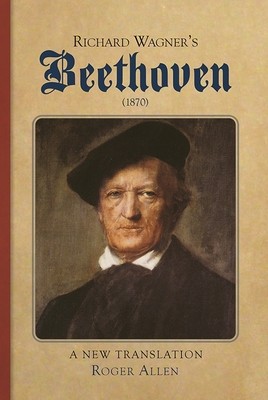
- We will send in 10–14 business days.
- Author: Roger Allen
- Publisher: Boydell Press
- ISBN-10: 184383958X
- ISBN-13: 9781843839583
- Format: 15.6 x 23.4 x 1.4 cm, kieti viršeliai
- Language: English
- SAVE -10% with code: EXTRA
Reviews
Description
Indispensable reading for historians and musicologists as well as those interested in Wagner's philosophy and the aesthetics of music.
Despite the enormous and accelerating worldwide interest in Wagner leading to the bicentenary of his birth in 2013, his prose writings have received scant scholarly attention. Wagner's book-length essay on Beethoven, written to celebrate the centenary of Beethoven's birth in 1870, is really about Wagner himself rather than Beethoven. It is generally regarded as the principal aesthetic statement of the composer's later years, representing a reassessment ofthe ideas of the earlier Zurich writings, especially Oper und Drama, in the light of the experience gained through the composition of Tristan und Isolde, Die Meistersinger von Nürnberg and the greater part of DerRing des Nibelungen. It contains Wagner's most complete exegesis of his understanding of Schopenhauer's philosophy and its perceived influence on the compositional practice of his later works. The essay also influenced the young Nietzsche. It is an essential text in the teaching of not only Wagnerian thought but also late nineteenth-century musical aesthetics in general.Until now the English reader with no access to the German original has been obliged to work from two Victorian translations. This brand new edition gives the German original and the newly translated English text on facing pages. It comes along with a substantial introduction placing the essay not onlywithin the wider historical and intellectual context of Wagner's later thought but also in the political context of the establishment of the German Empire in the 1870s. The translation is annotated throughout with a full bibliography. Richard Wagner's Beethoven will be indispensable reading for historians and musicologists as well as those interested in Wagner's philosophy and the aesthetics of music. ROGER ALLEN is Fellow and Tutor in Music at St Peter's College, Oxford.
EXTRA 10 % discount with code: EXTRA
The promotion ends in 22d.20:13:11
The discount code is valid when purchasing from 10 €. Discounts do not stack.
- Author: Roger Allen
- Publisher: Boydell Press
- ISBN-10: 184383958X
- ISBN-13: 9781843839583
- Format: 15.6 x 23.4 x 1.4 cm, kieti viršeliai
- Language: English English
Indispensable reading for historians and musicologists as well as those interested in Wagner's philosophy and the aesthetics of music.
Despite the enormous and accelerating worldwide interest in Wagner leading to the bicentenary of his birth in 2013, his prose writings have received scant scholarly attention. Wagner's book-length essay on Beethoven, written to celebrate the centenary of Beethoven's birth in 1870, is really about Wagner himself rather than Beethoven. It is generally regarded as the principal aesthetic statement of the composer's later years, representing a reassessment ofthe ideas of the earlier Zurich writings, especially Oper und Drama, in the light of the experience gained through the composition of Tristan und Isolde, Die Meistersinger von Nürnberg and the greater part of DerRing des Nibelungen. It contains Wagner's most complete exegesis of his understanding of Schopenhauer's philosophy and its perceived influence on the compositional practice of his later works. The essay also influenced the young Nietzsche. It is an essential text in the teaching of not only Wagnerian thought but also late nineteenth-century musical aesthetics in general.Until now the English reader with no access to the German original has been obliged to work from two Victorian translations. This brand new edition gives the German original and the newly translated English text on facing pages. It comes along with a substantial introduction placing the essay not onlywithin the wider historical and intellectual context of Wagner's later thought but also in the political context of the establishment of the German Empire in the 1870s. The translation is annotated throughout with a full bibliography. Richard Wagner's Beethoven will be indispensable reading for historians and musicologists as well as those interested in Wagner's philosophy and the aesthetics of music. ROGER ALLEN is Fellow and Tutor in Music at St Peter's College, Oxford.


Reviews